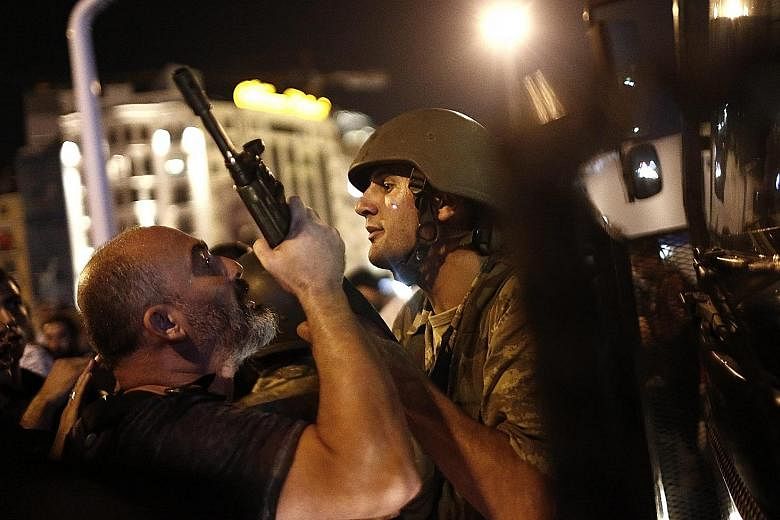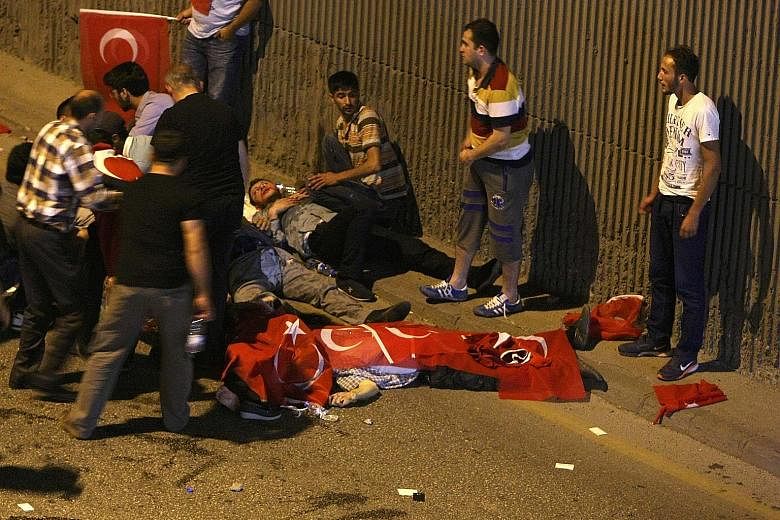Turkish President Recep Tayyip Erdogan moved swiftly yesterday to restore order after a failed coup that left more than 160 dead and over 1,400 injured in a country already on edge after a series of terror attacks.
Parts of the main cities of Istanbul and Ankara resembled a war zone as rebel troops battled for control of key buildings and explosions rang out. Tanks rolled down main streets, troops blocked off bridges and fighter jets screamed overhead.
Less than 12 hours after the coup was attempted on Friday by elements of the military, the government had largely restored control, detaining nearly 3,000 soldiers, while 2,745 judges were removed from duty. Mr Erdogan promised a stern response against those responsible for the biggest challenge to his 13-year rule.
"They will pay a heavy price for this," said Mr Erdogan, a polarising figure who also saw off mass public protests against his rule three years ago. "This uprising is a gift from God to us because this will be a reason to cleanse our army."
Mr Erdogan and his AK Party have long had a tense relationship with the military, which has traditionally seen itself as the guardian of Turkey's secular state founded by Mustafa Kemal Ataturk in 1923.
The coup collapsed after crowds answered the President's call to take to the streets and dozens of rebels abandoned their tanks. The coup is also believed to have failed because the rebel troops did not have the support of the police or the top layers of the military, which has the second-largest army in Nato after the United States Army.
A group calling itself the Peace at Home Movement said it launched the coup and planned to run the country via a "Peace Council". It said it wanted to restore constitutional order, democracy, human rights and freedoms, and supremacy of the law. But it quickly faced resistance from the public, who massed on the streets in defiance of the rebel troops.
The head of Turkey's main opposition, the secular Republican People's Party, also denounced the failed coup, joining a global chorus of condemnation.
World leaders called for stability in Turkey, a key bridge between Europe and the Middle East, and support for the democratically elected government. Turkey's regional allies yesterday also condemned the coup attempt. Iranian Foreign Minister Mohammad Javad Zarif hailed the Turkish people's "defence of democracy and their elected government".
Mr Erdogan was swift to blame his arch-foe, US-based cleric Fethullah Gulen, for being behind the coup attempt. He has repeatedly accused Mr Gulen, a former ally, of trying to foment an uprising in the military, media and judiciary. Mr Gulen strongly denied the accusation yesterday.
Mr Erdogan is expected to consolidate his authority, but analysts said that could inflame things further. While he has been hailed for bringing economic prosperity since he took office in 2003, he has faced growing criticism for his increasingly authoritarian rule. He also faces a deteriorating security and economic situation at home, which has hurt his popularity, while raising tensions with his neighbours with his blunt style of diplomacy.
"Was a coup inevitable? No. But those plotting it presumably believed they were saving Turkey from an increasingly out-of-touch and ideological leadership," wrote Dr Michael Rubin of the American Enterprise Institute in Foreign Policy magazine.
SEE TOP OF THE NEWS
President's ex-ally now his political foe
Turkish leader a deeply divisive figure
Chaos as branches of police and army fight, civilians flood streets
Narrow escape but danger not entirely averted



